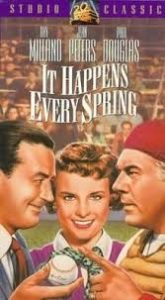Feelings
In the 1949 comedy, “It Happens Every Spring”, a college professor (Ray Milland) accidentally discovers a fluid that when wiped on an object (like a baseball) is repelled by wood (a bat). The Prof takes leave from the university to pitch in the Big’s. Cute story. Cute ending. Total fabrication.
Something else happens every spring. The Unicameral has been in session for three months. Committee hearings for every bill introduced are complete. Priority bills have been identified, and full-day floor debate begins (Tuesday).
Unlike the movie, not everyone in the Legislature will have a happy ending. Each of the 49 senators represent 37,000 constituents. Priorities vary from district to district. Priorities vary from senator to senator. Some senators are effective negotiators. Some are not. Some senators are convincing orators. Some are not. Some senators have egos….scratch that, all senators have egos.
Last week, several bills were filibustered on General File. Senators picked sides, like in dodgeball, and talked until time expired. The bills did not advance. Feelings were hurt. Threats were made. Promises unkept.
The state’s largest newspaper suggests, “senators must reach agreement”, “senators are sent to the Capitol to be policymakers” and “trust among senators is vital”. Bupkes! Two points:
- Sometimes the kids just don’t get along
- Blame partisan committees for advancing dumb bills to General File
The people of this state are dealing with boarder-to-boarder disaster, and the feelings of a few senators were hurt by a filibuster? Someone lied? Groucho said it best, “All people are born alike – except Republicans and Democrats.”
Twenty days until the budget. Forty days in the session.
NeABA Bills In Play
General File
- LB227 (Hughes) Nuisance bill. If a farming operation existed prior to changes in surrounding land use remains unchanged a farm or warehouse could retain right-to-farm protections for changes to the farming operation or public grain warehouse operations. A farm or warehouse shall not be found to be a nuisance if reasonable measures are employed to minimize dust, odors, etc. and the farm or grain warehouse complies with applicable laws and regulations, including zoning; and there is no significant change in the operation, the farm or warehouse has been in operation more than 1 year and was not a nuisance when it began.
Select File
- LB243 (Gragert) Creates the Healthy Soils Task Force to develop a comprehensive healthy soils initiative, and an action plan to carry out the initiative using specified standards as measures to assess improved soil health. With the assistance from outside resources, the task force shall examine how to provide farmers with research, education, technical assistance, and demonstration projects; examine options for financial incentives to improve soil health; and examine the contribution of livestock to soil health. The task force is to create a timeline to improve soil health within 5 years after completion of the action plan. The task force shall submit its action plan, as well as their findings and recommendations, by January 1, 2021. There are two slots on the committee for agribusiness members.
- LB320 (Albrecht) Brings provisions of the Pesticide Act into alignment with revisions to the Certification of Pesticide Applicators Rule, which establishes standards for state programs to certify persons applying restricted use pesticides (RUPs), training/competency to be demonstrated by applicators to obtain certification and licensure, and related record keeping. The revisions increase Federal applicator certification program standards, enhance pesticide safety training and standards for supervision of noncertified applicators, and establish a minimum age requirement for noncertified applicators using RUPs under the direct supervision of a certified applicator. States have until March, 2020 to submit to EPA revised certification plans that comply with the updated rule requirements.
Approved by the Governor
- LB284 (McCollister) Internet sales tax collection bill requires remote sellers (those without a physical presence in the state) and/or “marketplace facilitators” to collect and remit sales tax beginning July 1, 2019 if their gross revenue from sales into the state exceed $100,000, and sales into the state exceed 200 or more separate transaction in the same time period.
